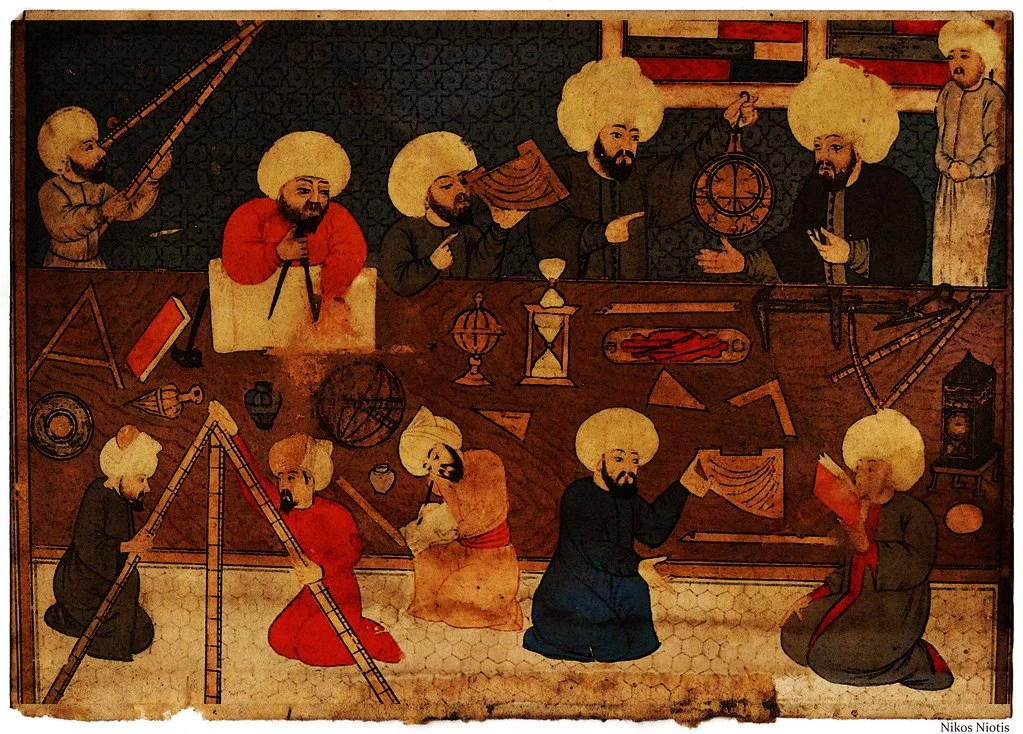A Very Brief Introduction to the Study of Economics During the Islamic Golden Age
There currently exists a western age of light in intellectual and academic life. When we think of economics as a discipline, many familiar names come to mind: Adam Smith, John Maynard Keynes, Milton Friedman, Thomas Piketty… These exceptionally brilliant individuals all come from the modern “West”. The list is obviously not limited to Western individuals. Nonetheless, we tend to associate the study of economics with Western Civilization, and perhaps for a somewhat valid reason; indeed, David Ricardo was certainly not born in Baghdad, nor did he study in Fez. But as always the case, the situation is far more complicated. Other civilizations and schools of thought contributed enormously to current progress, and today, they are frequently shunned, ignored, or even denied of their scientific importance. One of these great civilizations is that of the Arabo-Islamic world.
What is economics and where is it from?
Well, if we look at the Greek etymology it corresponds to the accounts: nomos, of households: locos. In no way shape or form did this field of study commence in 17th or 18th century Europe. From Plato and Aristotle, to the Chinese and Indian civilizations, there have been fruitful contributions. In this article, I will focus on that of the often ignored, or even denied, but spectacular Arabo-Islamic civilization, notably the works of Ibn Khaldun. The reason why I use the words “often ignored” is a long and complicated conversation that I shall not presently entertain, but I would advise any curious mind to read the works of Edward Said to start, in order to receive a comprehensive explanation.
Indeed, after two years of education in a western institution, Arabo-Islamic contribution to the fields of economics and mathematics have not been mentioned once, despite the latter being crucial and immensely rich, in my opinion.
What is the Islamic Golden Age?
While western civilization currently leads humanity’s quest for knowledge, discovery, and prosperity, this has not always been the case. From roughly the 8th to the 14th century, the Arabo-Islamic world led the race in the sciences, philosophy, medicine, poetry, and architecture. From Ibn Sina (known in the West as Avicenna) to Ibn Rushd (or Averroes) to Al-Khwarizmi (from whom we got algorithms), Rumi, Maimonides, Ibn Tufail and countless others, humanity benefited in ways that put millions of individuals, such as myself, in a state of awe and nostalgia.
In the field of sociology and economics, one mind stands out: Ibn Khaldun. He will be at the center of this article.
Ibn Khaldun and the Muqaddimah: A Precursor of Modern Economics
Ibn Khaldun, born in Tunis in 1332, was an Arab polymath. He contributed immensely to the study of sociology, history, and economics. He is frequently considered to be the father of modern sociology and a precursor to the European Renaissance, as well as one of the greatest minds of the Middle Ages, if not all time. According to Ibrahim M. Oweiss, economist and former advisor to US president Jimmy Carter, “His significant contributions to economics, however, should place him in the history of economic thought as a major forerunner, if not the "father," of economics, a title which has been given to Adam Smith, whose great works were published some three hundred and seventy years after Ibn Khaldun's death. Not only did Ibn Khaldun plant the germinating seeds of classical economics, whether in production, supply, or cost, but he also pioneered in consumption, demand, and utility, the cornerstones of modern economic theory.”Ibn Khaldun’s most famous work is the Muqaddimah (مقدّمة) which translates to “The Introduction”. It is a monumental work of universal history which unites many disciplines, including demography, sociology, philosophy, political theory, and economics. In a short article like this one, there is no opportunity for a comprehensive analysis of Ibn Khaldun economic thought, let alone that of the entire Islamic Golden Age, however, there is an example concerning his labor theory of value which I find particularly impressive.
In a strikingly similar way to Adam Smith and Ricardo, Ibn Khaldun writes “Despite the inputs of production, it is labor/human effort which gives value to a commodity, since it is necessary for all means including capital accumulation”, except that he did so four centuries prior. He also mentioned the concept of extra effort, which today can correspond to marginal productivity, when addressing the prosperity of society. Also, the great scholar wrote about capital accumulation and its relationship to the rise and fall of dynasties. He treated the dynamics of supply, demand, the role of governments and taxation. Furthermore, Ibn Khaldun was a defender of the free economy and freedom of choice. In his Muqaddimah, we read “Among the most oppressive measures, and the ones most deeply harming society, is the compelling of subjects to perform forced work unjustly. For labour is a commodity”.
Ibn Khaldun’s exceptional contributions to the field of economics should make him shine over humanity for his modernity and the influence his works have had in countless ways. Like many others of his time and origin, Ibn Khaldun must be rediscovered.
Edited by Nadira Anzum
Featured Image "Islamic Science and Technology" by Nikos Niotis is licensed under CC BY-NC 2.0.

